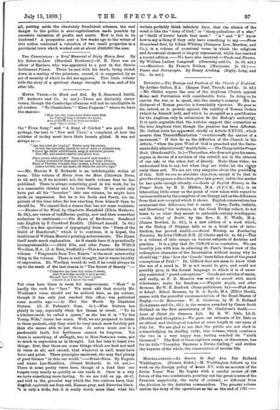Magian Vass.—In Black and Red. By E. Sharwood Smith. (W.
Andrews and Co. is. net.)—These are distinctly clever verses, though the Cambridge allusions will not be intelligible to all readers. "To Chailticlere," " Ebeu Fugaces !" where we have the stanza,—
"How fast the years have flown since first In Vinte6shop I donned the gown, And (frilitffli seed of woes accursed) Said 'Put it down' "—
the " Fives Song," and "A Song of Cricket" are good. But, perhaps, the best is "Now and Then," a complaint of how the athletes of to-day must have their laurels gilded. It was not always so :— "Aye, but what for trophy Pindar sang his praises,
Struck the quivering chords to tell of Andros Puissant son, Praised tpe limbs' achleVement, sang in deathless phrases. Hon will, and steeled resolve, and glory won.
Poets praise what profit ? Vain reward and slender
Doubly dowered he lives amid the sons of fame divine ; Hand of Phelclias wrought him—poised, a living spiendotm Limbs astrain, and lips apart, he whits the startet's sign.'
—Mr. Marcus S. E. Rickards is an indefatigable writer of verse. This volume of Music from the Maze (Chiswick Press, 4s. 6d. net) is, if we mistake not, the tenth volume that he has published. There is always sothething good in his work, for he is a reasonable thinker and he loves Nature. If he could only have put all his "beauties" into one volume, he might have made an impression. But he is too facile and fluent, too im- patient of the Haat labor, far less exacting from himself than he should be. We cannot find a stanza that has not some weakeess. —Flowers of the Wind, by Charlotte Mansfield (Elkin Mathews, 2s. 6d.), are verses of indifferent quality, now and then somewhat audacious in sentiment.—The Hymn of Bardaisan. Rendered into English by F. Crawford Burkitt. (Edward Arnold. 7s. 6d.) —This is a fine specimen of typography from the "Press of the Guild of Handicraft," which is to continue, it is hoped, the traditions of William Morris's printing achievements. The Hymn itself needs much explanation. As it stands here it is practically incomprehensible.—Child Ella, and other Poems. By Wilfrid Woollam, M.A. (J. A. Bain, Sheffield.)—This is another interesting volume. "Fragments from Two Hearts" is the most noteworthy thing in the volume. There is real thought, but it wants lucidity of expression. Mr. Woollam would do well if he could always be up to the mark of the last stanza in "The Secret of Beauty " :— " Dr:known the laws that make it sweet, And flowei•-like mould it as It grows;
Enough that when that face I meet, I know It as I know the rose."
Yet even here there is room for improvement. " Meet" is hardly the verb for " face." We must add that strictly Mr. Woollam's verse should not be noticed here, as his volume, though it has only just reached this office, was published some months ago.—In This Our World. By Charlotte Stetson. (G. P. Putnam's Sons. 58 )—Miss Stetson has Plenty to say, especially when her theme is revolt. "To be a kitchen-maid, be called a queen," as she has it in "To the Young Wife," raises her scorn. Well, we are prepared to listen to these protests, only they must be very much more forcibly put than she seems able to put them. In satire nimis acer is a pardonable fault, but feebleness cannot be forgiven. Yet there is something of strength, too, in Miss Stetson's verse, not so much in expression as in thought. Let her take to heart two things : first, that there are some things which are best not said in verse at all, and second, that whatever is said, must have force and point. These principles mastered, she may find plenty of good themes "in this our world."—Forest-Notes. By Eugene and Annie Lee-Haniilton. (Grant Richards. 3s. 6d. net.)— There is some pretty verse here, though of a kind that one forgets very nearly as quickly as one reads it. Once in a why we have something more lasting. So we are told on pp. 46-47, and told in the graceful way which the two authors have, that English squirrels are foxy-red, Kansas grey, and Bavarian black. Tt is only a trifle, but it is really worth more than what the 'writers probably think infinitely finer, that the silence of the wood is like the "song of bird," or "sharp pulsations of a star," or "thrill of lovers' hands that meet." "A" and " E " know how to say a thing if they only have something to say.—Prom Dreamland Sent, by Lilian Whiting (Sampson Low, Marston, and Co.), is a volume of occasional verse, in which the religious and devotional element is largely represented, rehieh has reached a second edition.—We have also received :,•—Weeds and Flowers. By William Luther Longstaff. (Greening and Co. 2s. 6d. net.) —Manabozo. By Francis Neilson. (Maequeen. 28. 6d.)— Poems and Paragraphs. By Henry Aveling, (Digby, Long, and Co. 55. net.)






































 Previous page
Previous page